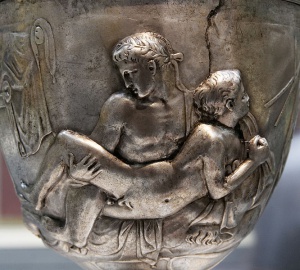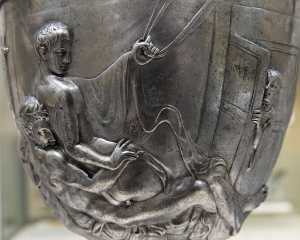(Boylove Documentary Sourcebook) - The Age Range for Young Male Beloveds as Given in a Poem by Strato

From Homosexuality in Greece and Rome: A Sourcebook of Basic Documents, edited by Thomas K. Hubbard (Berkeley: University of California Press, 2003). Footnote omitted.
Note: In the original ancient Greek text of this poem by Strato, the first age of his preferred time-span for eromenoi is given by the term δωδεκέτους, a masculine adjective meaning "twelve years old";[1] the word used for the second age is τρισκαιδεκέτης, a masculine noun signifying "thirteen years old";[2] the expression given for the third age, δὶς ἑπτὰ, means "twice seven",[3][4] hence "fourteen"; and the expression used for the fourth age, τρίτης πεντάδος, signifies "third pentad",[5][6] hence "fifteen". The terms given for the fifth and sixth ages are both ordinal adjectives: ἑξεπικαιδέκατον, meaning "sixteenth";[7] and ἑβδόματον δὲ καὶ δέκατον, signifying "seventh and tenth",[8][9] hence "seventeenth". While the presence of ordinal numerals could theoretically suggest the use of inclusive counting (by which the sixteenth year would be equivalent to age fifteen, and the seventeenth year to age sixteen), according to W. S. Barrett, although the practice was customary in ancient Greece, its application was not without discrepancies; for example, a switching of counting methods occurs in Strophe 3 of "Olympian Ode 8" by Pindar, in which exclusive reckoning is used when pertaining to the first generation of Aeacus' descendants, whereas inclusive reckoning is applied instead when mentioning the fourth generation (i. e., his great-grandsons).[10]
Strato wrote during the time of the Roman emperor Hadrian (117–38 C.E.) and compiled a collection of his own and earlier poets’ pederastic epigrams.
[...]
I delight in the prime of a twelve-year-old,
But thirteen is more desirable than this.
He who masters twice seven has a sweeter flower of Love;
The one beginning thrice five is more delightful still.
The sixteenth is the year of the gods; the seventeenth
Is not for me to seek, but for Zeus.
But if one has desire for those yet older, no longer does he play,
But he now seeks the one “answering him back.”

References
- ↑ https://lsj.gr/wiki/%CE%B4%CF%89%CE%B4%CE%B5%CE%BA%CE%AD%CF%84%CE%B7%CF%82
- ↑ http://www.perseus.tufts.edu/hopper/morph?l=triskaideke%2Fths&la=greek&can=triskaideke%2Fths0&d=Perseus:text:1999.04.0058:entry=triskaideke/ths&i=1
- ↑ https://en.wiktionary.org/wiki/%CE%B4%CE%AF%CF%82
- ↑ https://en.wiktionary.org/wiki/%E1%BC%91%CF%80%CF%84%CE%AC
- ↑ https://en.wiktionary.org/wiki/%CF%84%CF%81%CE%AF%CF%84%CE%BF%CF%82
- ↑ https://en.wiktionary.org/wiki/%CF%80%CE%B5%CE%BD%CF%84%CE%AC%CF%82
- ↑ https://en.wiktionary.org/wiki/%CE%B5%CC%94%CE%BA%CE%BA%CE%B1%CE%B9%CE%B4%CE%B5%CC%81%CE%BA%CE%B1%CF%84%CE%BF%CF%82
- ↑ https://hellas.bab2min.pe.kr/hk/ebdomatos?l=en
- ↑ https://hellas.bab2min.pe.kr/hk/dekatos?l=en&form=de/katon&q=de%2Fkaton
- ↑ W. S. Barrett, Greek Lyric, Tragedy, and Textual Criticism: Collected Papers, ed. M. L. West (Oxford; New York: Oxford University Press, 2007), pp. 159–160.
See also
- Puerilities: Erotic Epigrams of "The Greek Anthology" (book)
- Adult friend (dictionary)
- Age of attraction (dictionary)
- Boylove
- Catamite
- Ephebophilia
- Erastes
- Greek love
- Historical boylove relationships in ancient Greece
- Historical boylove relationships in ancient Rome
- Loved boy (dictionary)
- Minor-attracted person (dictionary)
- Pedophilia
- Philosophy of ancient Greek pederasty
- Young friend (dictionary)